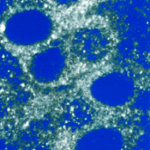An Interview of Robin Hanson On His New Book “The Age of Em”
Robin Hanson is an associate professor of economics at George Mason University and a research associate at the Future of Humanity Institute of Oxford University. He is also a longtime supporter of the Brain Preservation Foundation. In this interview we talk with Dr. Hanson about his upcoming book, “The Age of Em: Work, Love and Life when Robots Rule the Earth” (coming out June 1st) and his general thoughts about the future of brain emulation.
Michael Cerullo: Dr. Hanson, thank you for sharing your thoughts on brain emulation and your upcoming book. Can you tell us how you became interested in brain emulation?
Robin Hanson: Brain emulations, also known as “ems” or “uploads,” have been a staple of science fiction and futurism for many decades, and many a late night college “bull” session has debated if a computer emulation of a particular human brain is possible, if it would be conscious, or if it would be the “same” person. But as I became a professional social scientist, I realized that the question of what a world full of ems would actually be like was neglected, and that I was in an unusually good position to try to answer it.
Michael Cerullo: In your new book, “The Age of Em: Work, Love and Life when Robots Rule the Earth”, you focus on understanding the implications of brain emulations (or ems). Can you briefly explain what a clan is?
Robin Hanson: An em “clan” is the set of all emulations who are descended from the same original human. While each human can start an em clan, intense economic competition results in most ems coming from the few hundred biggest clans, descended from the humans whose minds are best suited to being productive in the em world. The transition to an em era thus produces an enormous inequality of long term human influence.
Michael Cerullo: One of your main conclusions is that the future may be ruled by clans based on a few hundred or at most a few thousand individuals. Do you see this as a dystopia or a utopia (or neither)?
Robin Hanson: Overall the em world seems to me an improvement over our world, but it is far from a utopia. Ems work most of the time, but they are very good at and obsessed with their jobs. They mostly live and work in spectacular quality virtual realities, have indefinite lifespans and need never feel hunger, pain, sickness, or grime. Given the cultural plasticity of human values, we should beware of projecting our current values onto ems. But if em lives are worth anywhere near as much as our lives, then the huge em population strongly suggests that the em world contains great value.
Michael Cerullo: One of your most interesting predictions is how ems may have a very different definition of death. For example, ems may split of copies temporally (called spurs) and then delete these copies without feeling like anyone has died. Yet isn’t it possible that ems will care very much about personal identity and share our own definition of death? Doesn’t some of this depend on the reality of what exactly personal identity is?
Robin Hanson: If you took a drug at the start of a party that meant you wouldn’t remember it the next day or later, at party’s end you probably wouldn’t see yourself as about to “die,” even though that is a way of seeing the situation. Instead, you’d probably see yourself as continuing the next day but forgetting part of your history. Ems can see spurs similarly, as parts of themselves that they don’t remember. Humans are culturally plastic enough to be able to see endings and identity in many different ways, and the em world is competitive enough to select for attitudes that promote productive behaviors. And spurs are very productive. There is no “reality” of personal identity; within a wide scope we can choose what to see as “me.”
Michael Cerullo: Do you think Ems will be conscious?
Robin Hanson: Ems will be even more articulate in arguing for their consciousness than are we, no identifiable em features will concretely support claims that ems are unconscious, and ems will dominate the world while not looking kindly on em-consciousness skeptics. A few curmudgeonly ideologues may hold out, but most everyone who interacts with ems regularly will cave and publicly accept their consciousness. I’ll be with the majority.
Michael Cerullo: You seem to be predicting that Ems will care less about the truth and more about pragmatics. For example, you give many scenarios where Ems are willing to have themselves lied to (e.g. a willingness to implant a false memory of a big vacation so they will be more productive). Isn’t this a dangerous path for Ems to develop?
Robin Hanson: Implanting false memories seems mostly infeasible during the early em era, but ems can self-deceive by under-correcting for selection bias when they remember a history of mostly leisure. Humans today self-deceive often in such ways, even though this has dangers, in part to help us signal confidence. It seems plausible that ems will continue this habit.
Michael Cerullo: How do we transmit our values to Ems of the future given that it is always possible to find some outlier of human behavior and upload this personality which may be a more efficient worker? Or do you think transmitting our values is simply anthropomorphizing values that aren’t relevant to Ems?
Robin Hanson: All of our ancestors had to accept that they had little power to prevent competitive processes from changing the genes and cultures of their descendants. Strong global coordination is required to prevent this from continuing, and we still have only weak abilities and inclinations toward global coordination. It seems plausible that this trend will continue at least into the early em era.
Michael Cerullo: Another of your main points is the power of evolutionary arguments in economics. Are saying that ultimately only the most efficient economy will be successful, all other considerations aside?
Robin Hanson: We now live in a brief unusual “dreamtime” with high and rising incomes and a fast changing environment. In such an era, even culture can’t adapt fast enough and so behavior can long stay maladaptive. So behavior becomes set more by “demand”, i.e., by preferences, and by how they change as wealth lets us feel more secure. But for almost all animals, and for most of the forager and farmer eras, the “supply” of labor efficiency was in fact a stronger driver of behavior. The em era seems likely to return to this usual situation. This is far from an abstract untested theory; it is the usual historical case.
Michael Cerullo: You predict that democracy may be unsustainable due to its inefficiencies. But aren’t there other benefits to democracy that might compensate for this?
Robin Hanson: Ems would still use democracy, but than we do less relative to strong leaders, because of new disadvantages of democracy and new advantages of strong leaders. One person one vote no longer works, and em leaders can run faster, use close copies for key supporting roles, and use safes to convince citizens of their good governance.
Michael Cerullo: Thanks for taking the time to share your thoughts on these fascinating topics.









